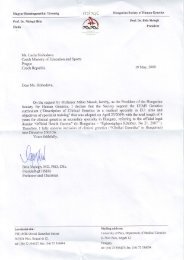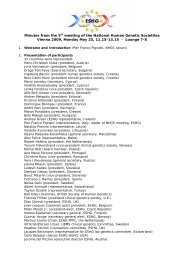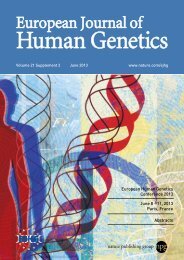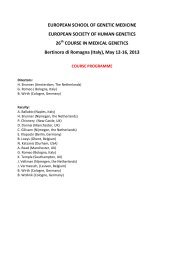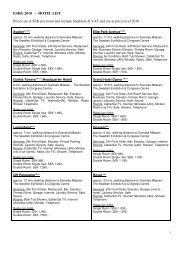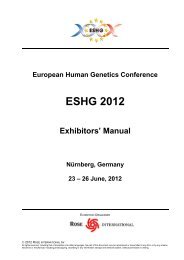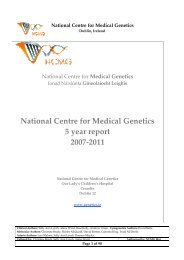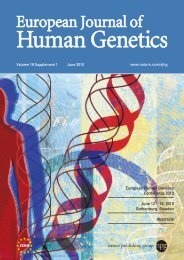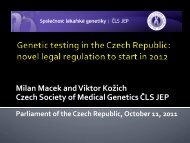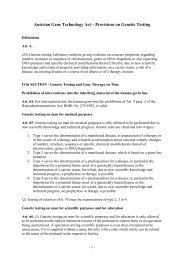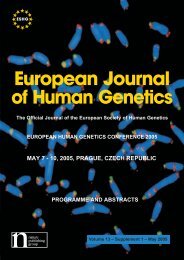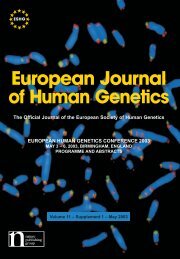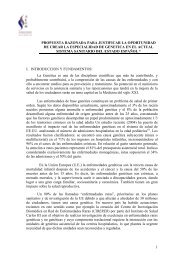2008 Barcelona - European Society of Human Genetics
2008 Barcelona - European Society of Human Genetics
2008 Barcelona - European Society of Human Genetics
You also want an ePaper? Increase the reach of your titles
YUMPU automatically turns print PDFs into web optimized ePapers that Google loves.
EMPAG Posters<br />
EP14.12<br />
the role <strong>of</strong> the specialist midwife in Fetal medicine Units.<br />
F. Pancetti 1 , S. Boxall 2 , C. Bravi 3 , A. Kustermann 3 , P. Simi 1 , I. Cetin 3 , D. A.<br />
Coviello 3 ;<br />
1 Dipartimento di Ostetricia e Ginecologia, AOU Pisana, Pisa, Italy, 2 Fetal Medicine<br />
Unit, Princess Anne Hospital, Southampton, United Kingdom, 3 Fondazione<br />
IRCCS, Ospedale Maggiore Policlinico, Mangiagalli e Regina Elena, Milan,<br />
Italy.<br />
The role <strong>of</strong> the midwife in fetal medicine unit in UK is quite well defined.<br />
Some specific actions are: advocate and support for women;<br />
provision <strong>of</strong> information about the nature <strong>of</strong> the abnormality (both written<br />
and verbal) for women and other health pr<strong>of</strong>essionals; counselling<br />
women about their choices regarding the pregnancy, and preparing<br />
women for either termination <strong>of</strong> pregnancy or continuing with a baby<br />
who has abnormalities; led clinics for antenatal counselling and follow<br />
up after TOP and bereavement care; communication with other<br />
health pr<strong>of</strong>essionals to ensure continuity <strong>of</strong> care for women . In Italy<br />
the role <strong>of</strong> specialist midwife is still quite heterogeneous, depending<br />
on the presence or not <strong>of</strong> a well defined Fetal Medicine Units. We<br />
present a collaborative effort to share experience between UK and<br />
Italian midwife in defining the appropriate skill required as advanced<br />
communication skills; counselling training; specialist knowledge about<br />
prenatal diagnosis; highly developed analytic and judgemental skills;<br />
planning and organisational skills; technically adept; leadership skills;<br />
IT literate; support for self- emotional and psychological .<br />
The aim <strong>of</strong> this collaborative work is to define a general framework that<br />
describe the role <strong>of</strong> the specialist midwife in fetal medicine in order to<br />
establish a model that can be applied internationally .<br />
The work <strong>of</strong> the specialist midwife in Fetal Medicine is challenging and<br />
rewarding, and <strong>of</strong>fers scope for providing excellence in clinical care for<br />
pregnant women and their families .<br />
EP14.13<br />
collecting data <strong>of</strong> HD patients for the Euro-HD Registry: an<br />
uptodate from Rome sites<br />
P. Zinzi 1 , A. Fasano 2 , A. Guidubaldi 2 , T. Ialongo 2 , G. Loria 2 , F. Soleti 2 , A. R.<br />
Bentivoglio 2 , S. Romano 1,3 , M. Spadaro 1,4 , G. Jacopini 1 , M. Frontali 4 ;<br />
1 Institute <strong>of</strong> Cognitive Science and Technologies, National Research Council,<br />
Rome, Italy, 2 Institute <strong>of</strong> Neurology, UCSC, Rome, Italy, 3 UOC Neurology<br />
Azienda Ospedaliera Sant’Andrea, Rome, Italy, 4 Institute <strong>of</strong> Neurobiology and<br />
Molecular Medicine, CNR, Rome, Italy.<br />
The Euro-HD Network is aimed at providing a platform for pr<strong>of</strong>essionals<br />
and people affected by HD and their relatives in order to facilitate<br />
collaboration throughout Europe . The core <strong>of</strong> the study is the Registry,<br />
a systematic collection <strong>of</strong> clinical research data <strong>of</strong> HD patients, <strong>of</strong> mutation<br />
carriers and <strong>of</strong> individuals who are part <strong>of</strong> HD families .<br />
Two study sites participate to Euro-HD network in Rome: one is at<br />
the Consiglio Nazionale Ricerche (C .N .R .) and is based on the long<br />
lasting cooperation between two main institutes <strong>of</strong> public research, the<br />
Institute <strong>of</strong> Cognitive Sciences and Technologies (I .S .T .C/CNR) and<br />
the Institute <strong>of</strong> Neurobiology and Molecular Medicine (I .N .M .M/CNR);<br />
the other one is at the Neurology Department <strong>of</strong> the Università Cattolica<br />
del Sacro Cuore (U .C .S .C .) Both sites are involved in running an<br />
outpatient clinic for HD patients started in 1989 as a common research<br />
project and which has assumed, since 1994, the characteristic <strong>of</strong> a<br />
multidisciplinary clinic . The individuals followed at the clinic are 312:<br />
65% are symptomatic patients, 20% are subjects at risk (pre-test neurological<br />
examination), 15% are asymptomatic gene carriers (post-test<br />
follow-up) .<br />
For the Euro-HD project, from Sept 2004 to Dec . 2007 we have completed<br />
and entered into the Registry the data collection <strong>of</strong> 75 patients<br />
(37 Males and 38 Females): 69 symptomatic patients and 6 asymptomatic<br />
gene carriers . For further 15 patients we are now completing<br />
the last forms and their data will be entered quite soon .<br />
Data analysis and comments on different aspects <strong>of</strong> data collection<br />
will be reported .<br />
EP14.14<br />
The risks & benefits <strong>of</strong> screening for Klinefelter syndrome: A<br />
critical analysis<br />
A. S. Herlihy 1,2,3 , J. Halliday 1,4 , R. I. McLachlan 2,3 , M. Cock 3 , L. Gillam 1,5 ;<br />
1 Murdoch Childrens Research Institute, Melbourne, Australia, 2 Monash University,<br />
Melbourne, Australia, 3 Andrology Australia, Melbourne, Australia,<br />
4 5 Melbourne University, Melbourne, Australia, Melbourne University, Melbourne,<br />
Austria.<br />
Background: Klinefelter Syndrome (KS) is a genetic condition (47,XXY)<br />
affecting males and resulting in a spectrum <strong>of</strong> clinical features, ranging<br />
from infertility, androgen deficiency and breast development to varying<br />
levels <strong>of</strong> cognitive, social, behavioural and learning difficulties. The<br />
prevalence has been estimated to be 1:650, yet up to 70% <strong>of</strong> males<br />
remain undiagnosed. Early identification has been advocated for many<br />
years, but population-based genetic screening for KS has never been<br />
explored .<br />
Aim: To identify the potential risks and benefits that could arise from<br />
implementing population-based genetic screening for KS at different<br />
ages and stages <strong>of</strong> development .<br />
Method: A framework was developed to assess the medical (hormone,<br />
therapeutic interventions), psychological (self-esteem, relationships)<br />
and ethical (autonomy, associated stigma) implications <strong>of</strong> genetic<br />
screening for KS in four hypothetical age-dependent scenarios - newborn,<br />
infancy, primary school entry and high school entry - chosen as<br />
providing opportunistic circumstances in which an individual might be<br />
evaluated . The outcomes have been considered in relation to diagnosis<br />
in adulthood and the most common scenario <strong>of</strong> lifelong non-diagnosis.<br />
Evidence <strong>of</strong> potential risks and benefits associated with KS<br />
diagnosis was collected by analysis <strong>of</strong> the existing literature .<br />
Results: Our analysis indicates that while there is information on available<br />
medical, educational and psychological interventions, there has<br />
been no consideration <strong>of</strong> the impact <strong>of</strong> age <strong>of</strong> diagnosis and the related<br />
timing <strong>of</strong> interventions on psychosocial and other quality <strong>of</strong> life<br />
outcomes .<br />
Conclusion: More research is needed to fill these evidential gaps and<br />
inform decisions regarding population-based genetic screening for<br />
KS .<br />
EP14.15<br />
Genetic counselling training and supervision in a second<br />
language: is it different?<br />
R. D. Vanneste, J. Fitzpatrick, L. Russell;<br />
McGill University, Montreal, QC, Canada.<br />
Purpose: Live supervision is a key component <strong>of</strong> the training <strong>of</strong> genetic<br />
counsellors . However, the ways in which training and supervision differ<br />
for students and supervisors when these activities occur in a second<br />
language have not yet been explored .<br />
Method: A questionnaire was distributed to members <strong>of</strong> the CAGC and<br />
NSGC using the online survey provider, www .surveymonkey .com® .<br />
Data were analyzed using a consensual qualitative method modified<br />
from Hill et al . (1997) .<br />
Results: Supervisors find it difficult to assess students’ psychosocial<br />
counselling skills in the second language, and feel personal discomfort<br />
in having an incomplete understanding <strong>of</strong> session content . Students, in<br />
turn, describe decreased competence when counselling in their second<br />
language, and a greater focus on the medical aspects than on the psychosocial<br />
dimensions . Interestingly, students whose second language<br />
is French (mainly Canadian) describe more negative experiences and<br />
more difficulties in certain areas, such as building rapport with patients,<br />
than do students who counsel in Spanish (mainly American) . This may<br />
reflect differences in patient expectations for receiving service in their<br />
native tongue in Canada compared to the US . The language <strong>of</strong> training,<br />
whether it is the student’s first or second, was described as having<br />
a major impact on counselling abilities and comfort level in the second<br />
language . Overall, however, the use <strong>of</strong> second languages in training<br />
seems to have a positive impact for both students and supervisors,<br />
leading to increased satisfaction in providing linguistically and culturally-centered<br />
patient care. The implications <strong>of</strong> these findings for genetic<br />
counselling training will be discussed .<br />
EP14.16<br />
“Asking for oncogenetic counseling”: evaluation <strong>of</strong><br />
psychological aspects, need for information and perceived risk<br />
E. Razzaboni, D. Turchetti, D. Fabbro, E. Pompilii, A. Petracca, C. Graziano, A.<br />
Wischmeijer, M. Seri, G. Romeo;<br />
Operative Unit <strong>of</strong> Medical Genetic, Bologna, Italy.<br />
The amount <strong>of</strong> clients seeking oncogenetic counselling (OGC) is rapidly<br />
growing up . Understanding communicational aspect and clients’<br />
styles <strong>of</strong> information seeking, together with personality, is fundamental



